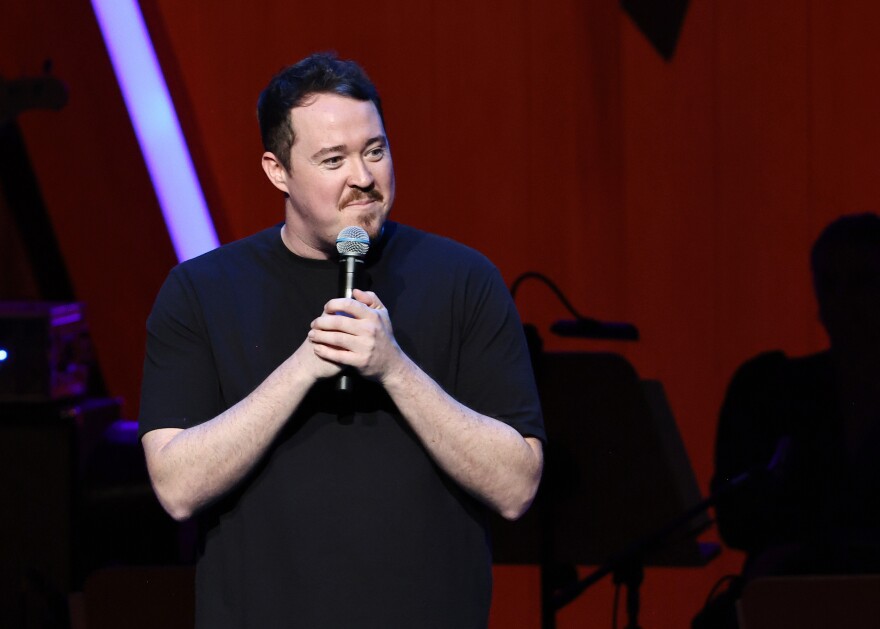Anyone who thought comic Shane Gillis would emerge confident and defiant, hosting Saturday Night Live nearly five years after he was fired from the cast amid a backlash over racist and transphobic jokes, had to be a little disappointed with his monologue last night.
Gillis didn't spend much time joking about the controversy or the rise in his comedy career that led him to return to the show. "Don't look that up," he cracked seconds after walking onstage to greet the audience. "If you don't know who I am, please don't Google that."
There wouldn't be any gloating or in-your-face jokes. Instead, Gillis moved on quickly, turning in an uneasy opening monologue punctuated with slight stabs at being naughty. He joked that "every little boy is just their mom's gay best friend" and offered a bit about how people with Down syndrome – including relatives — are some of the happiest people he knows.
As the monologue wore on, Gillis seemed increasingly uncomfortable – even for a comic whose onstage persona is a slightly awkward, sorta doofus. More than once, he quipped that he expected a joke to get a bigger laugh, noting at one point, "This place is extremely well-lit. I can see everyone not enjoying it." (laughter in the room where SNL broadcasts from sometimes sounds louder to viewers at home than to the performers onstage.)
An ingenious response
But in some ways, it was an ingenious response to the backlash Saturday Night Live faced in bringing him on as a host. Viewers who might be aware of the criticism but didn't spend time looking over the podcasts where he dropped racial slurs, antisemitic language and homophobic/transphobic quips likely watched his monologue and wondered what the fuss was about.
Gillis may be attempting something that's increasingly tough to do in a media world where every podcast and standup gig is recorded and uploaded somewhere – talking to his core audience in a way that is more explicit and button-pushing than the comedy he offers for a more general audience, like his Netflix special or Saturday Night Live.
Unfortunately, I spent time listening to some of that podcast materialbefore the SNL episode. So I felt more cynical watching him joke about how his sister adopted three Black children and married an Egyptian man, so visiting their house was "like getting in the craziest Uber pool you've ever been in." Or seeing him reference how he and his family established a coffee shop in their hometown where people with Down syndrome can work.
Or the joke that got the biggest laugh, where he imagined his niece with Down syndrome being insulted by a white kid at school and then a group of "three Black kids come flying out of nowhere and just start whaling on that cracker." (Why exactly would they do that? And why does race matter here? I know – I'm overthinking. But it just felt like a lazy excuse to give the crowd a joke about a slur-slinging white person getting some comeuppance.)
Much of it felt like Gillis' attempt to insulate himself from criticism and avoid any jokes that could revive the backlash. But since he also didn't really explain or explore the controversy swirling around his appearance, it all took on the feel of an opportunity missed. Or a subject ducked.
My cynicism extended to the other sketches and bits in the show, which often felt like they could have been inspired by the rambling jokes on his podcasts. This stuff included a skit where Gillis is the patriarch of a white family visiting a Black church in Jamaica – allowing him to use a terrible Jamaican accent for a few jokes – to the game show where he played a white man who pretended not to recognize Martin Luther King Jr. and Oprah because he was afraid to say the wrong name on TV. (One of his opponents was a Black woman who didn't recognize the Mona Lisa or Michelangelo's statue of David, which stung even worse.)
The fate of comedy rebels
Saturday Night Live made its reputation as a group of comedy rebels making fun of a stuffy political and media establishment, lampooning corrupt and inept politicians from Richard Nixon to Sarah Palin; in other words, punching up.
But today's comedy rebels see the insistence that comics lay off insulting slurs about marginalized people as the new establishment — building successful podcasts, standup tours and more on the mistaken notion that avoiding racism, sexism and homophobia is somehow shackling their free speech. Here, punching down is fair game and fairly lucrative.
I'd feel more tolerant about all of this stuff if I thought these comics were saying anything new about race, gender or society. If they were pushing boundaries to bring new ideas to the table — instead of complaining about how crude they're not allowed to be — at least we'd be talking about important comedic concepts.
But Gillis' turn on SNL last night felt more like an attempt to court a new demographic and poke a bit at liberal sensibilities, allowing longtime executive producer Lorne Michaels to still feel like a rebel rather than the Lord of Showbiz Comedy he has become.
In the process, viewers got an OK episode that, more than anything, might leave them wondering why a middling talent like Gillis got tapped to host the show in the first place.
Copyright 2024 NPR. To see more, visit https://www.npr.org.




